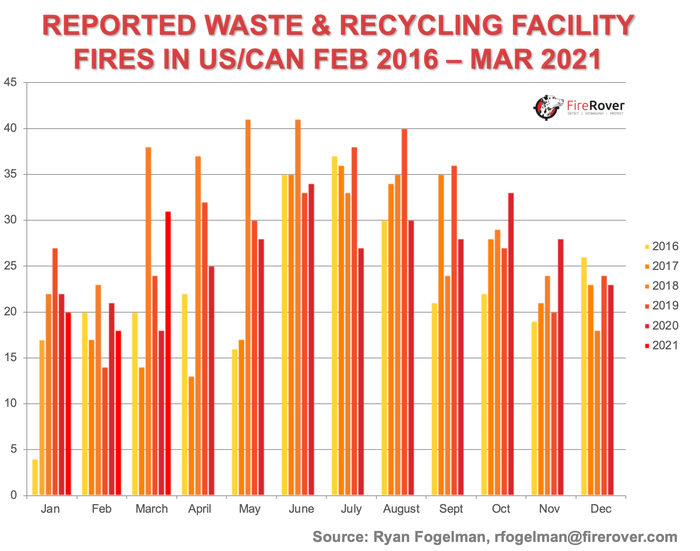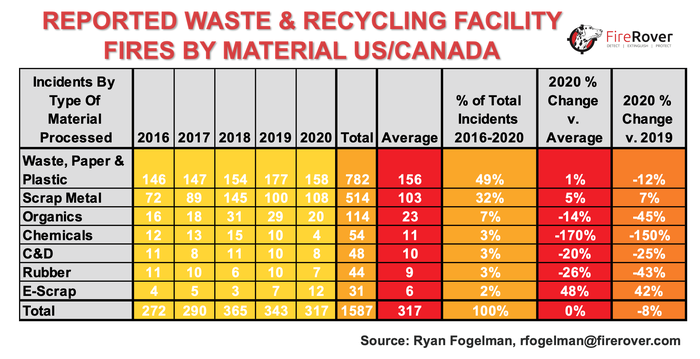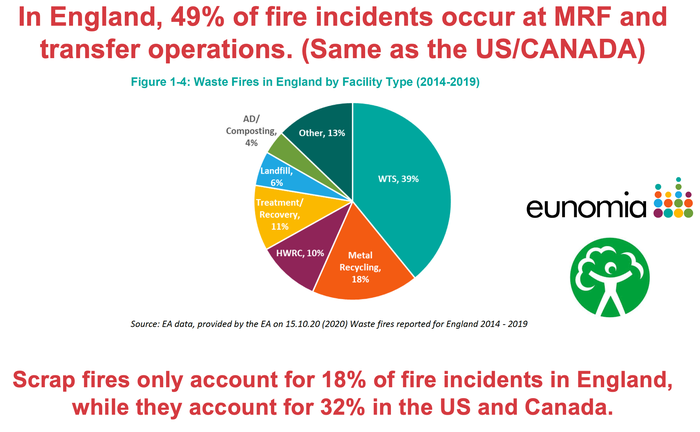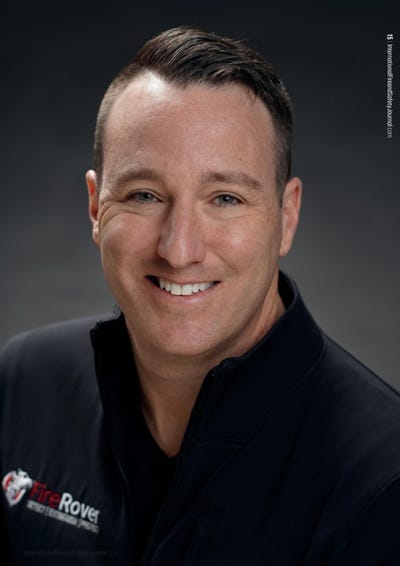March 2021 Fires Up: A Conversation with the New Face of Scrap Metal, Brett Dr. Hustle Ekart

January, February, and March are in the rear-view mirror and although the first two months of the year were par for the course, in March we incurred 31 reported fire incidents, the second highest March for fire incidents since 2016. Of the 69 reported fires in the first quarter, 32 of the incidents occurred at waste, paper and plastic operations, 22 metal, 6 organic, 5 C&D, 3 chemical, and 1 rubber. At Fire Rover we eliminated 34 fires in the first quarter, over half of those occurring in March.

As we head toward the summertime spike in fires along with the expected economic growth of a post-pandemic year, we need to stay diligent in our fire prevention programs. Over the past year our operators have been forced to focus on PPE and training to help employees from contracting COVID, but as our vaccines take hold and we more toward the new normal, we need to get back to our focus on fire prevention, training, and investments in fire elimination solutions.
 Of interesting note, fires in scrap metal facilities are on the rise. In 2020, scrap metal fires started to increase from their large drop in 2019 or depending on your interpretation, their huge spike in 2018. In fact, in September 2020, we saw the second-highest number of fires at scrap metal facilities than we have experienced in the past five years I have been tracking the reported fire data. (Read the 2020 Annual Waste & Recycling Facility Fire Report)
Of interesting note, fires in scrap metal facilities are on the rise. In 2020, scrap metal fires started to increase from their large drop in 2019 or depending on your interpretation, their huge spike in 2018. In fact, in September 2020, we saw the second-highest number of fires at scrap metal facilities than we have experienced in the past five years I have been tracking the reported fire data. (Read the 2020 Annual Waste & Recycling Facility Fire Report)

Additionally, Eunomia completed a study where reported metal fires in the UK made up 18% of fire incidents, whereas in the US, the number is 32%. Fires at scrap metal operations occur in their ASR piles, shredders and their tin piles. Here is an example of our Fire Rover dealing with a fire incident at a light tin pile. (See https://youtu.be/4r9q1MLbtf0) Scrap metal facility operators understand this problem and are working to mitigate their specific risks. One operator, Brett Ekart of United Metals Recycling, is going the extra mile to keep his operations and employees safe.
I sat down with Ekart to learn more about his unique beginnings, how he’s incorporating technology and automation into his operations and how he’s sharing his best practices and life lessons with others in the waste and recycling industry across his LinkedIn pulpit.
A Conversation with Brett Ekart, aka Dr. Hustle
“I have a family I love, and I have a job I love. My LinkedIn is real. This is me. I say what is on my mind.” –Brett Ekart
I have been on LinkedIn since the early 2000s, and if you’re a member of LinkedIn, you know it is NOT social media. It is a digital network tool that has many advantages for meeting people, building professional relationships and doing business. The biggest value I see is that I am not tied to being force-fed news from large media outlets and newspapers. By choosing the people, businesses, organizations and groups I follow, I am provided with a daily feed that allows me to choose what articles I want to read, videos I want to watch and people I want to follow learn from.
A few years ago, I started seeing Brett Ekart’s profile start popping up on my feed. Ekart is a third-generation scrap metal operator whose grandfather started a single yard with a partner in 1972. A few years later, Ekart’s dad bought out his grandfather and opened a second yard, where Ekart and his friends worked and gained industry experience.
Once Ekart graduated high school, he stepped away from the family business, United Metals Recycling, for a short period to get his bachelor’s degree in business from Eastern Oregon University and to play D3 football. In 1998, he made his return to the family business and surrounded himself with “people who have smarts, drive and hustle, not necessarily with a formal education but drive based on the real-world execution.”
“In 1998, I had the right team that was ready to help me take the business to the next level, so I ended up buying out my dad and eventually adding additional lines of business to the two scrap yards,” says Ekart.
Fast forward to today, Ekart now has eight operations across Idaho and Oregon, including a few large ancillary businesses that offer services such as pipe relining, pipe manufacturing, trucking and hauling.
“When you play on the right team, you know whether you are a winner or a loser before you play the game,” states Ekart.
When Ekart and I first connected on LinkedIn, I asked him about the issue of fire in his operation, and he shared his story with me. Ekart had bought a mobile baler with less than 100 hours on it for $500,000 at an auto salvage, but when one of his workers baled a car, the battery in the car was either overlooked or not taken out properly because it created a spark that caused the car to catch fire.
“The employee opened the bale chamber versus keeping it closed, so the tires caught on fire, and it was game over,” explains Ekart. “The biggest issue with that fire wasn’t the insurance or cleanup cost, it was the ‘opportunity cost’ of work that I missed out on due to six months of downtime and my customers going to my competitor.”
Since that incident, Ekart and his team have ramped up their fire prevention and safety efforts, such as cleaning radiators and investing in more automation and technology.
“Over the years, I’ve found that I don’t need the latest and greatest, but I do need equipment that will allow me to have the best quality,” says Ekart. “Innovation can be something that is old from a technology standpoint as long as it fits the need you are looking to fill.”
To say that Ekart lives a simple life would be an understatement. In addition to being a CEO, he’s a flag football coach for both of his sons’ teams; a host of his podcast titled “A Scrap Life,” which covers the scrap metal recycling industry and how the industry has played a role in peoples’ lives; a husband to his wife; and a go-to expert for scrap metal knowledge.
“My key to life is to live as close to my zero point as possible, and unlike most folks my zero point is almost zero,” he says. “I work with my best friends, and we work hard to keep our 200 employees and their families fed. Some days we eat filet, but if we have to go back to eating PB&J to keep the lights on, it wouldn’t phase me a bit.”
“People on LinkedIn ask me all the time for advice on the state of the metals market,” he says. “I get asked whether copper prices are going to go up or down. If I knew that I would be trading copper futures and not cutting copper wire. My outlook on long-term health of the industry is looking strong. I am optimistic but realistic about the base metal industries right now, and I do think there is room for a strong pricing standpoint for the metal industry.”
Ekart’s outlook is based on the fact that China was consuming 40 percent of the world’s copper and now India, Malaysia and others are starting to build infrastructure that’s driving demand for copper. He says he only invests in what he knows, and he’s “all in” on this long-term forecast. “Yesterday I won, today I won, and tomorrow I will win.... I am one of the lucky ones.
I love what I do and who I get to do with it. I have always known what I was going to do, but that doesn’t stop me from trying new things. True entrepreneurship to me is looking for business adventures and opportunities that you can enjoy the journey more than the trophies. One of my biggest criteria when trying/attempting new business ventures is I enjoy the individual(s) I am doing it with. Because if I can’t enjoy the new ride, I will continue on with the current one that I know I already enjoy!”
Conclusion
So why did I give Brett the nickname Dr. Hustle? Brett told me that he has an MBA that he earned through night school. Why did he do it you ask? Since he was the first of his family to earn a bachelor’s degree, he thought, man wouldn’t it be great to be the first in his family to earn an MBA. He has yet to go back to get a doctorate, but I promised if you are lucky enough to spend a couple of minutes with him, you will see he not only deserves a doctorate in the scrap business, but in life.
As for incidents at scrap metal facility fires specifically, I will continue to do the analysis but the 32% has held steady since 2016 including the first quarter of this year. Why are they higher in North America versus the UK? This is something I would continue to spend time researching. Please do not hesitate to reach out if you have some insight.
If you have yet to read the “4th Annual Reported Waste & Recycling Facility Fires Annual Report,” it is available online and via PDF (email me at [email protected] for a copy). The National Waste & Recycling Association will be hosting a webinar, “Tame the Li-ion: An In-Depth Report on Waste & Recycling Facility Fires in the US/CAN” on Wednesday, April 14th at 11:00AM Est. where I plan to walk through the full findings of my annual report, discuss the risks and the costs we incur as an industry, provide preparation tools to help mitigate the risks and answer any questions. You can register for the webinar at https://register.gotowebinar.com/register/1593843673075546639.
Ryan Fogelman, JD/MBA, is vice president of strategic partnerships for Fire Rover. He is focused on bringing innovative safety solutions to market, and two of his solutions have won the distinguished Edison Innovation Award for Industrial Safety and Consumer Products. He has been compiling and publishing the “Reported Waste & Recycling Facility Fires In The US/CAN” since February 2016 and the “Waste & Recycling Facility Fires Annual Report.” Fogelman speaks regularly on the topic of the scope of fire problems facing the waste and recycling industries, detection solutions, proper fire planning and early-stage fire risk mitigation. Additionally, Fogelman is on the National Fire Protection Association’s Technical Committee for Hazard Materials. (Connect with Ryan on LinkedIn at https://www.linkedin.com/in/ryanjayfogelman or email at [email protected])
About the Author
You May Also Like




.png?width=300&auto=webp&quality=80&disable=upscale)